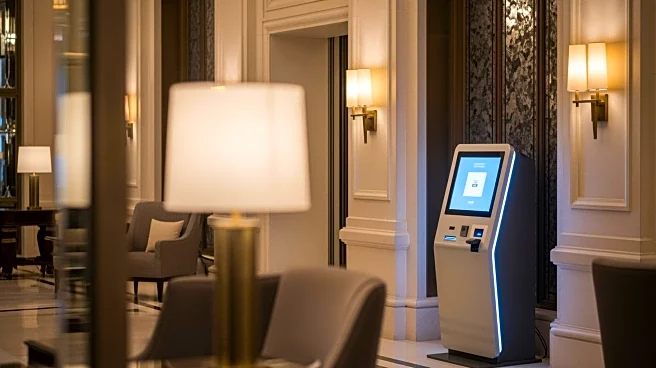What's Happening?
A joint report by Skift and Mews, titled 'Why Hotels and Their Investors Are Leaving Millions on the Table,' challenges the traditional room-based performance metrics in the hospitality industry. Historically, success in this sector has been measured
by occupancy rates, average daily rate (ADR), and revenue per available room (RevPAR). However, the report suggests that these metrics no longer capture the full value created in modern hospitality, which increasingly focuses on guest experiences and relationships. The report highlights a shift towards guest-centric measures such as Revenue per Available Guest (RevPAG), which accounts for the total value of each guest interaction. Lifestyle brands like Ennismore are generating significant revenue from non-room sources, including food & beverage, coworking, and events. The report also notes that nearly one-third of hotels on the Mews platform now offer additional bookable services, with a significant increase in reservations between 2024 and 2025.
Why It's Important?
The shift from room-based metrics to guest-centric measures represents a significant transformation in the hospitality industry. This change is driven by evolving guest expectations for experiences, flexibility, and meaningful connections. Hotels that adapt to this trend can unlock new sources of income, enhance guest loyalty, and achieve long-term growth. The report suggests that focusing solely on room sales may result in missed revenue opportunities. By adopting community-based strategies, hotels can enhance guest experiences and strengthen asset value. This shift also highlights the role of technology in enabling personalized and efficient service delivery, which can further enhance guest satisfaction and operational efficiency.
What's Next?
As the hospitality industry continues to evolve, hotels may increasingly adopt guest-centric strategies to remain competitive. This could involve reimagining properties as community spaces that serve both locals and travelers, offering diverse services beyond traditional room bookings. The integration of technology to streamline operations and personalize guest experiences is likely to become more prevalent. Hotels that successfully implement these strategies may see increased revenue and guest satisfaction, positioning themselves for sustainable growth in the future.
Beyond the Headlines
The shift towards guest-centric measures may have broader implications for the hospitality industry, including changes in investment strategies and property valuations. As hotels focus on creating community value, they may also contribute to local economic development and cultural enrichment. This trend could lead to a redefinition of hospitality as a sector that prioritizes relationships and experiences over traditional metrics.
















